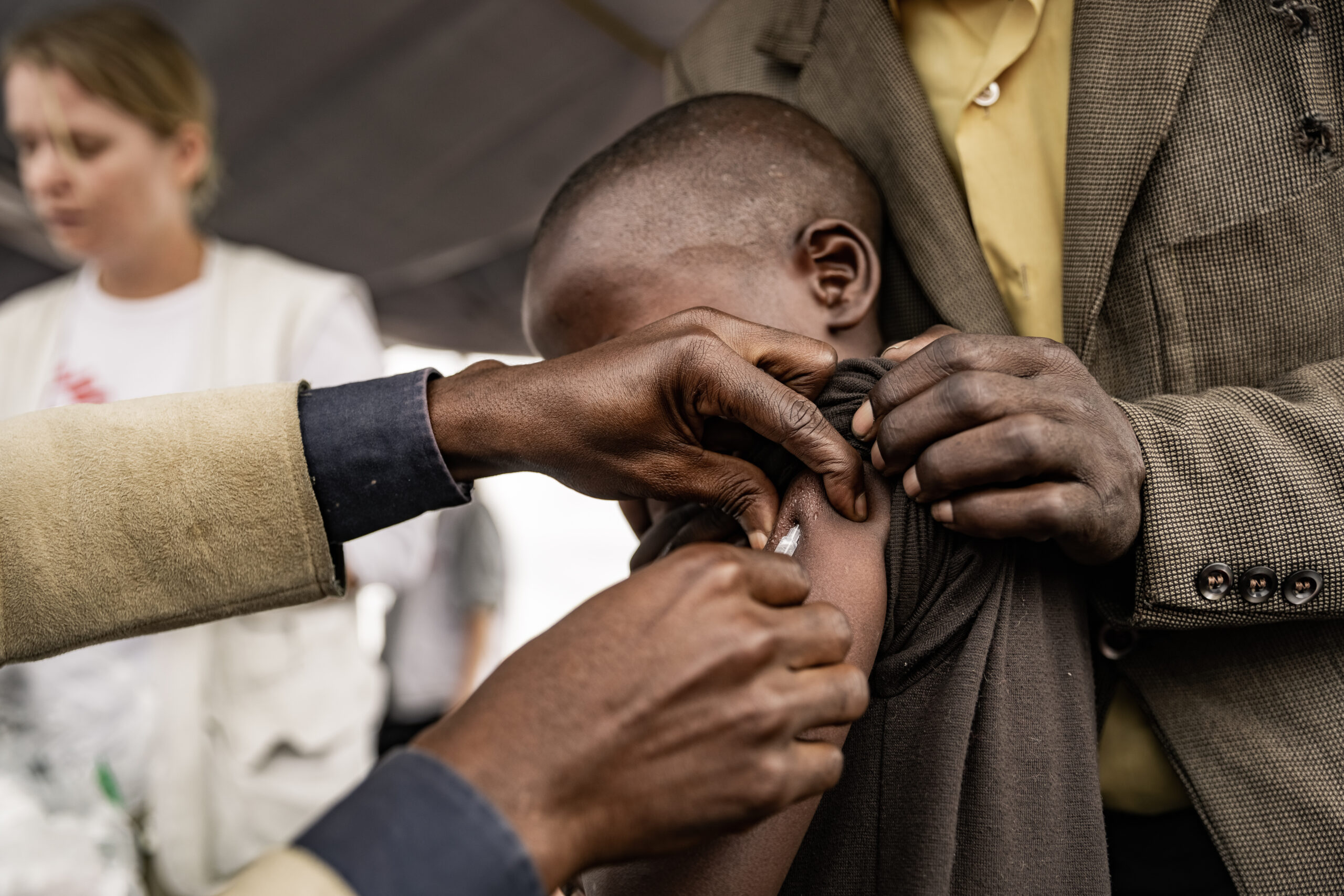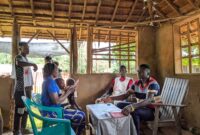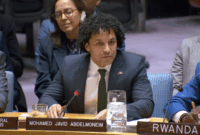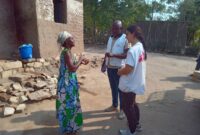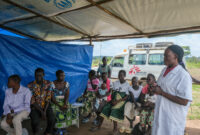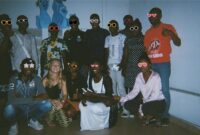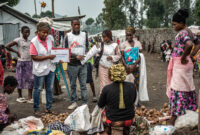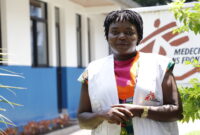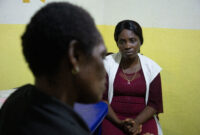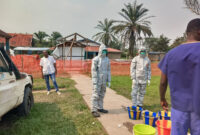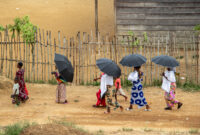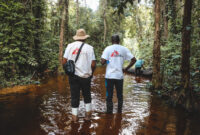Democratic Republic of Congo: How MSF teams have responded to a measles outbreak in Masisi amid ongoing clashes
Health workers vaccinate over 100,000 children despite the conflict.
In early June, Doctors Without Borders/Médecins Sans Frontières (MSF) and the Ministry of Health (MoH) teams conducted a large-scale vaccination campaign in the Masisi health zone in response to the ongoing measles epidemic. Despite the challenging environment marked by insecurity and logistical difficulties due to fighting, together we vaccinated more than 100,000 children.
Measles outbreaks remain a persistent challenge across Democratic Republic of Congo (DRC), largely due to low vaccination coverage. Ongoing armed conflict – especially in the east – has made it even more difficult to control this highly contagious and potentially deadly disease, which primarily affects young children.
Such is the case in North Kivu province, which alone accounted for more than a fifth of the country’s reported 27,000 measles cases during the first five months of the year. The Masisi health zone is one of the many areas in the province currently facing an epidemic, having reported more than 1,000 suspected cases and four deaths from January to the end of May – a figure that is likely significantly underestimated.
“This vaccination campaign arrived at a critical moment because many children in our community have recently contracted measles. In my household, only one person had been vaccinated before.”
Anuarite Nyirabimana, who brought her children to be vaccinated near the village of Kanyati
Throughout the same period, MSF-supported facilities in just three areas within the same health zone treated 1,158 patients for measles, including 238 hospitalized in Masisi’s general referral hospital.
Thousands of parents brought their children to be vaccinated against measles during a mass campaign, led by the MoH with support from MSF in the area.
“This vaccination campaign arrived at a critical moment because many children in our community have recently contracted measles. In my household, only one person had been vaccinated before,” says Anuarite Nyirabimana, who brought her children to be vaccinated near the village of Kanyati.
The campaign, which ran from June 5 to 10, saw more than 100,000 children between the ages of six months and five years vaccinated. It also provided treatment to many children suffering from measles and malnutrition – a condition that increases the risk of severe measles complications.
“Insecurity in eastern DRC not only makes outbreaks of diseases like measles more likely – it also makes the response more challenging. It is vital that we act now to get this outbreak under control.”
Helena Cardellach, an MSF coordinator based in Masisi
“We are seeing some serious cases of malnutrition,” says Sadiki Nzazimanye Aimable, an MSF nurse who worked on the campaign. “Almost everyone here lives off the land, but many have had to flee their homes and fields because of the fighting. The price of beans has tripled in recent months and some people are unable to feed themselves.”
Insecurity fuels epidemics
Located half a day’s drive from Goma, the capital of North Kivu, the Masisi health zone lies in one of DRC’s most volatile regions. In recent months, it has witnessed intense fighting between the M23/AFC rebel group and the Armed Forces of the Democratic Republic of the Congo (FARDC) and its allies.
Armed violence in the area has directly affected MSF. Since the beginning of the year, the MSF-supported Masisi general referral hospital has been struck by bullets on multiple occasions and two MSF staff members have been killed.
“Insecurity in eastern DRC not only makes outbreaks of diseases like measles more likely – it also makes the response more challenging. It is vital that we act now to get this outbreak under control,” says Helena Cardellach, an MSF coordinator based in Masisi.
“When the M23/AFC took control of Goma in January, the airport was shut down,” she adds. “This means that the major gateway for vaccine deliveries to the east has been closed for months and that vaccine stocks – typically flown from Kinshasa – have been run dry since the start of the year.”
While the airport closure is exacerbating the challenges associated with vaccination, mass displacement due to conflict has allowed the disease to spread rapidly from community to community. The first cases reported in Masisi health district originated in Mweso, more than four hours away by car.
To tackle the spread of the disease, MSF had to supply most of the vaccines and essential medical supplies for the campaign.
“We faced several logistical challenges. Many health centres in the area don’t have fridges or cool boxes to store vaccines so we have had to supply those. One health centre has even had its solar panels stolen, meaning they can’t power the fridges anyway.”
Sadiki Nzazimanye Aimable, an MSF nurse who worked on the campaign
“Our teams sometimes arrived in villages to find that many people have fled due to fighting,” says Cardellach. “At the same time, other areas where we had expected to find a small number of people were heavily populated, due to newly arrived displaced people.
Ongoing clashes meant it was difficult to obtain safe access to some areas. Moving forward, we call on all parties in the conflict to facilitate safe access for medical teams, vaccines and other key supplies.”
During the campaign, MSF also supported the MoH by establishing cold chain systems to keep vaccines at the required temperature, training vaccination teams and leading community outreach efforts.
“We faced several logistical challenges. Many health centres in the area don’t have fridges or cool boxes to store vaccines so we have had to supply those. One health centre has even had its solar panels stolen, meaning they can’t power the fridges anyway,” says Nzazimanye Aimable.
At another vaccination site in Katale, Maman Dorcas brought her child for vaccination after learning about the campaign through MSF’s community outreach officers.
“Two weeks ago, my neighbour’s child fell ill with measles,” Maman tells our team. “This triggered me to bring my children here. I’ve also been encouraging others to come so that their children are protected from developing serious illness if they are infected.”
Every child vaccinated is a step closer to herd immunity, but much work remains. Measles is one of the most contagious of all infectious diseases. Achieving the recommended 95 per cent coverage with two doses is essential to prevent future outbreaks.
Tackling measles remains a priority for MSF in DRC. In 2024, our teams vaccinated more than 1.2 million children against the disease and treated nearly 30,000 patients across the country.
